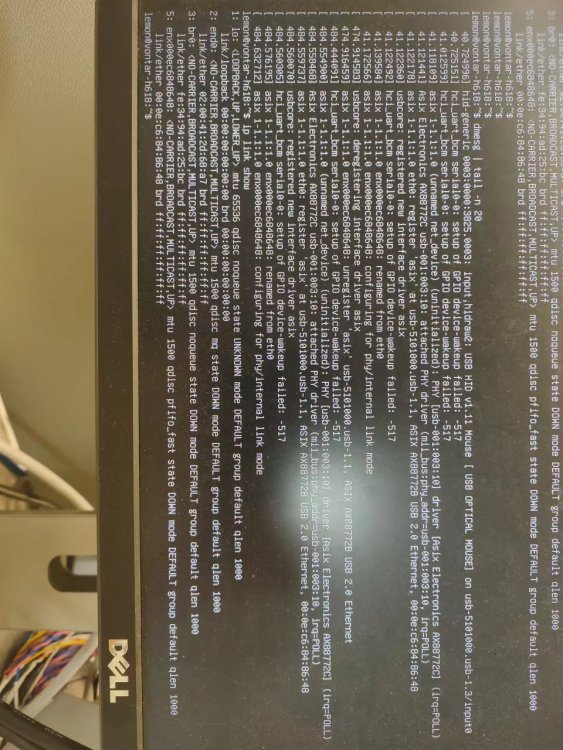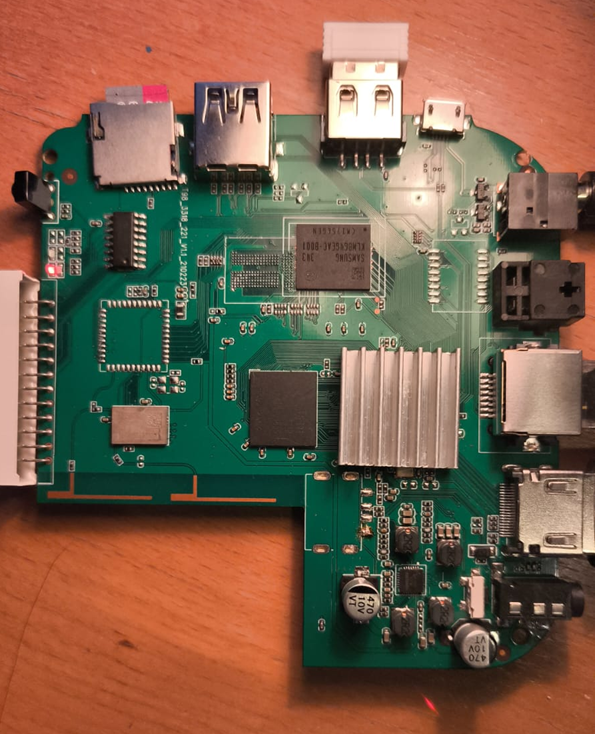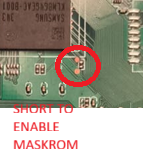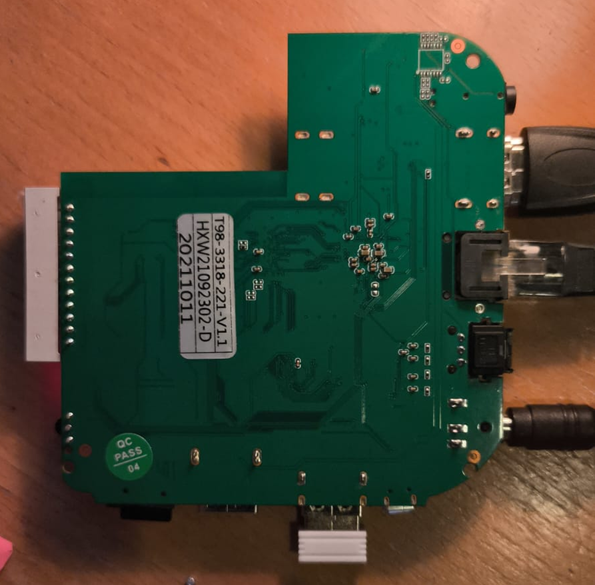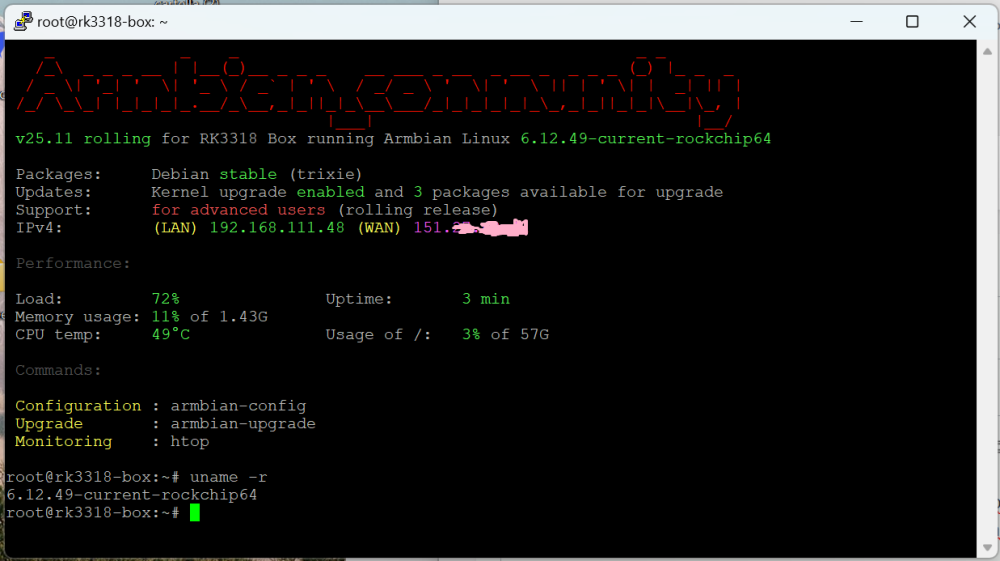All Activity
- Past hour
-
Assuming that you installed the standard image, then I suspect this is the same bug that I identified here: I submitted a PR to patch this, which has been accepted into Armbian, but it won't have flowed through into the releases yet, so you will need to build the image (instructions also linked in the subsequent post)
-

Radxa-cubie-a5e second Ethernet port not work after update
Samixa replied to Samixa's topic in Allwinner sunxi
Maybe this -> https://github.com/torvalds/linux/commit/a15f095b590bcc1968fbf2ced8fe87fbd8d012e0 - Today
-
Hi, Recently I reinstalled system on my Odroid C1+ from older Ubuntu with original 3.10.107 to newest Armbian with kernel 6.12.44. Generally it works quite well but I see a lots of stalls detection warnings in logs: Thu Oct 9 02:00:26 2025] rcu: INFO: rcu_sched self-detected stall on CPU [Thu Oct 9 02:00:26 2025] rcu: 0-....: (1799 ticks this GP) idle=a184/1/0x40000004 softirq=1089909/1089910 fqs=488 [Thu Oct 9 02:00:26 2025] rcu: (t=2100 jiffies g=2037329 q=10 ncpus=4) [Thu Oct 9 02:00:26 2025] CPU: 0 UID: 0 PID: 7987 Comm: kworker/0:1 Not tainted 6.12.44-current-meson #2 [Thu Oct 9 02:00:26 2025] Hardware name: Amlogic Meson platform [Thu Oct 9 02:00:26 2025] Workqueue: events dbs_work_handler [Thu Oct 9 02:00:26 2025] PC is at __slab_free+0x0/0x314 [Thu Oct 9 02:00:26 2025] LR is at kmem_cache_free+0x120/0x378 [Thu Oct 9 02:00:26 2025] pc : [<c056fd04>] lr : [<c05716fc>] psr: 800f0113 [Thu Oct 9 02:00:26 2025] sp : f0801b58 ip : ef6a6398 fp : c2387fc0 [Thu Oct 9 02:00:26 2025] r10: c5844380 r9 : c2352740 r8 : 000e6e80 [Thu Oct 9 02:00:26 2025] r7 : c11dd1d4 r6 : c66a0000 r5 : ef7dfe80 r4 : c280ef80 [Thu Oct 9 02:00:26 2025] r3 : c66a0000 r2 : c66a0000 r1 : ef7dfe80 r0 : c280ef80 [Thu Oct 9 02:00:26 2025] Flags: Nzcv IRQs on FIQs on Mode SVC_32 ISA ARM Segment none [Thu Oct 9 02:00:26 2025] Control: 10c5387d Table: 062a404a DAC: 00000051 [Thu Oct 9 02:00:26 2025] Call trace: [Thu Oct 9 02:00:26 2025] __slab_free from kmem_cache_free+0x120/0x378 [Thu Oct 9 02:00:26 2025] kmem_cache_free from tcp_rcv_established+0x428/0x6cc [Thu Oct 9 02:00:26 2025] tcp_rcv_established from tcp_v4_do_rcv+0x180/0x284 [Thu Oct 9 02:00:26 2025] tcp_v4_do_rcv from tcp_v4_rcv+0xbc0/0x1068 [Thu Oct 9 02:00:26 2025] tcp_v4_rcv from ip_protocol_deliver_rcu+0x30/0x27c [Thu Oct 9 02:00:26 2025] ip_protocol_deliver_rcu from ip_local_deliver_finish+0x7c/0x98 [Thu Oct 9 02:00:26 2025] ip_local_deliver_finish from ip_sublist_rcv_finish+0x3c/0x50 [Thu Oct 9 02:00:26 2025] ip_sublist_rcv_finish from ip_sublist_rcv+0x174/0x1e4 [Thu Oct 9 02:00:26 2025] ip_sublist_rcv from ip_list_rcv+0xe8/0x114 [Thu Oct 9 02:00:26 2025] ip_list_rcv from __netif_receive_skb_list_core+0x188/0x1f4 [Thu Oct 9 02:00:26 2025] __netif_receive_skb_list_core from netif_receive_skb_list_internal+0x180/0x288 [Thu Oct 9 02:00:26 2025] netif_receive_skb_list_internal from napi_gro_receive+0x15c/0x264 [Thu Oct 9 02:00:26 2025] napi_gro_receive from stmmac_napi_poll_rx+0x9f8/0xfa0 [Thu Oct 9 02:00:26 2025] stmmac_napi_poll_rx from __napi_poll.constprop.0+0x2c/0x1c8 [Thu Oct 9 02:00:26 2025] __napi_poll.constprop.0 from net_rx_action+0x328/0x3a4 [Thu Oct 9 02:00:26 2025] net_rx_action from handle_softirqs+0x114/0x338 [Thu Oct 9 02:00:26 2025] handle_softirqs from irq_exit+0x8c/0xbc [Thu Oct 9 02:00:26 2025] irq_exit from call_with_stack+0x18/0x20 [Thu Oct 9 02:00:26 2025] call_with_stack from __irq_svc+0x98/0xb0 [Thu Oct 9 02:00:26 2025] Exception stack(0xf1851c60 to 0xf1851ca8) [Thu Oct 9 02:00:26 2025] 1c60: c28f4d30 00000000 00000000 00000000 c28f4d80 c282bd80 c282b480 016e3600 [Thu Oct 9 02:00:26 2025] 1c80: 00000000 c28f4240 00000001 f1851d40 800f0013 f1851cb0 c0dec028 c0dec02c [Thu Oct 9 02:00:26 2025] 1ca0: 600f0013 ffffffff [Thu Oct 9 02:00:26 2025] __irq_svc from __clk_recalc_accuracies+0x54/0x68 [Thu Oct 9 02:00:26 2025] __clk_recalc_accuracies from clk_core_set_parent_nolock+0x204/0x274 [Thu Oct 9 02:00:26 2025] clk_core_set_parent_nolock from meson8b_cpu_clk_notifier_cb+0x78/0x8c [Thu Oct 9 02:00:26 2025] meson8b_cpu_clk_notifier_cb from notifier_call_chain+0x8c/0x108 [Thu Oct 9 02:00:26 2025] notifier_call_chain from srcu_notifier_call_chain+0x40/0x98 [Thu Oct 9 02:00:26 2025] srcu_notifier_call_chain from __clk_notify+0x80/0xac [Thu Oct 9 02:00:26 2025] __clk_notify from clk_propagate_rate_change+0x98/0xb0 [Thu Oct 9 02:00:26 2025] clk_propagate_rate_change from clk_propagate_rate_change+0x5c/0xb0 [Thu Oct 9 02:00:26 2025] clk_propagate_rate_change from clk_propagate_rate_change+0x5c/0xb0 [Thu Oct 9 02:00:26 2025] clk_propagate_rate_change from clk_propagate_rate_change+0x5c/0xb0 [Thu Oct 9 02:00:26 2025] clk_propagate_rate_change from clk_core_set_rate_nolock+0xf4/0x31c [Thu Oct 9 02:00:26 2025] clk_core_set_rate_nolock from clk_set_rate+0x30/0x154 [Thu Oct 9 02:00:26 2025] clk_set_rate from _opp_config_clk_single+0x24/0x84 [Thu Oct 9 02:00:26 2025] _opp_config_clk_single from _set_opp+0x10c/0x41c [Thu Oct 9 02:00:26 2025] _set_opp from dev_pm_opp_set_rate+0x124/0x230 [Thu Oct 9 02:00:26 2025] dev_pm_opp_set_rate from __cpufreq_driver_target+0x394/0x6ac [Thu Oct 9 02:00:26 2025] __cpufreq_driver_target from od_dbs_update+0x148/0x174 [Thu Oct 9 02:00:26 2025] od_dbs_update from dbs_work_handler+0x2c/0x58 [Thu Oct 9 02:00:26 2025] dbs_work_handler from process_one_work+0x168/0x3b8 [Thu Oct 9 02:00:26 2025] process_one_work from worker_thread+0x264/0x42c [Thu Oct 9 02:00:26 2025] worker_thread from kthread+0xe0/0xfc [Thu Oct 9 02:00:26 2025] kthread from ret_from_fork+0x14/0x28 [Thu Oct 9 02:00:26 2025] Exception stack(0xf1851fb0 to 0xf1851ff8) [Thu Oct 9 02:00:26 2025] 1fa0: 00000000 00000000 00000000 00000000 [Thu Oct 9 02:00:26 2025] 1fc0: 00000000 00000000 00000000 00000000 00000000 00000000 00000000 00000000 [Thu Oct 9 02:00:26 2025] 1fe0: 00000000 00000000 00000000 00000000 00000013 00000000 Is there a way to fix it ?
-
Hi, for 2 day i am searching for set a bootlogo on the screen while loading klipper but all i get is the linux text that fly by. I set bootlogo= true in armbianEnv.txt does not help i can't find any other option. There should also be Splash can find any decent information about that either So is it possible to show a logo at booting klipper, if yes is it also possible to change it to custom logo or video because it would be nicer to show a logo or video then al these linux lines And i am not a professional programmer so easy language if possible
-
Yep, looks like it's about the netplan renderer. I've tried the actual image instead of the one I built locally and even just a reboot is able to reproduce the issue. The main difference is that on the image I built networking was via NetworkManager by default, while the image on the website uses systemd-networkd.
-
Any news on this subject ? Official Ubuntu is too limited .... I'm thinking to change to armbian my server ..... To install it, does it need a full recompilation ? or is there an img ? where can I find the DTB file for M2 ?
-

Efforts to develop firmware for H96 MAX V56 RK3566 8G/64G
guenter replied to Hqnicolas's topic in Rockchip CPU Boxes
@Hqnicolas I'm a bit late because I have overlooked your request for testing. Now I can confirm that the AuxDisplay works correctly with my H96_tvbox_3566 (with AIC 8800 wlan chip). Thank you for your effort. -

Radxa-cubie-a5e second Ethernet port not work after update
Nob0dy replied to Samixa's topic in Allwinner sunxi
Ok, it works, but is there a solution to this problem? -
I don't have any I/O errors, which makes me think that your eMMC might be defective because I don't get these errors when I stress mine.
-
-
@Nick AThank you for your suggestion. I can boot up normally using this img, but the wired network cannot be recognized. There is no network. Armbian-unofficial_25.05.0-trunk_Vontar-h618_bookworm_edge_6.12.11_server.img 1. I want to know how to extract the DTS file from the Android .img file and use it in my existing ARMbian system. 2. What should I do if the wired network connection is not recognized?
-
Hardware: OrangePI-5-Plus (rk3588), with "32 GB" of RAM Operating System: Debian Trixie (pure, except EFI boot and Armbian edge kernel) Root File System: Ext4 (encrypted) Desktop: KDE Plasma 6.3.6 (wayland, GDM3), KDE Frameworks version: 6.13.0, QT version: 6.8.2 EFI Source: https://github.com/edk2-porting/edk2-rk3588 The boot messages, after a few starts (spaced apart) of the low-memory-monitor.service, say there's a failure to start it. After booting is complete, here's a screenshot of the output of: systemctl status low-memory-monitor.service This error didn't show up until I installed a number of packages. I tracked down the offending package from the Trixie repository: Package: xfsprogs Version: 6.13.0-2+b1 Size: 4774 kB Description: A set of commands to use the XFS filesystem, including mkfs.xfs Once this package was removed, the error vanished, and a repeat of the above Status command reported low-memory-monitor-service as active and okay. I also found that, while the error occurred with the Armbian edge 6.16.4 kernel, it did NOT occur with the Debian 6.16.3 kernel. Kernel With The Error (kernel source: Armbian trixie) --------------------- Package: linux-image-edge-rockchip64 (Armbian Linux edge kernel image 6.16.4-edge-rockchip64) Version: 25.8.1 Size: 282 MB Kernel Without The Error (kernel source: Debian trixie-backports) ------------------------ Package: linux-image-6.16.3+deb13-arm64-unsigned (Linux 6.16 for 64-bit ARMv8 machines) Version: 6.16.3-1~bpo13+1 Size: 210 MB I also briefly tried regressing the Armbian edge kernel from 25.8.1 (6.16.4) to the previously available version of 25.5.2, which was 6.16.0-rc3 (I think). The error occurred with that kernel as well. An Effect of This Bug (Possibly) When this error was showing up, I was once using the internet (firefox-esr package version 140.3.1esr-1~deb13u1) for a while, when after closing it, I discovered that my desktop background image had changed on its own. I could not change it back, no matter what I did (in the KDE settings gui). I could change it to something else, but whenever I changed it back, the altered image returned instead of what it should have been. But once I rebooted, the background was back to normal. While this one experience (very much an outlier) may not be conclusive, it is indicative of a possible memory leak.
-
@SuperKali I have the original NanoPC-T6 - purchased around 2 years ago. While it does negotiate HS400 mode, it's not stable - medium or heavy I/O activity like performing an apt upgrade or even booting will cause I/O errors to be logged by the kernel. I've just tried switching to 6.16.4-edge-rockchip64 via armbian-config. It took a few attempts to get it booted - it hung several times at "begin: running /scripts/init-bottom ... done". On the successful boot, I could see quite a few I/O errors during boot. Here's the kernel logs showing HS400 mode was negotiated along with the I/O errors: root@nanopct6:~# dmesg | grep mmc [ 1.776595] mmc0: SDHCI controller on fe2e0000.mmc [fe2e0000.mmc] using ADMA [ 1.875696] mmc0: new HS400 Enhanced strobe MMC card at address 0001 [ 1.876758] mmcblk0: mmc0:0001 A3A444 230 GiB [ 1.880737] mmcblk0: p1 [ 1.881457] mmcblk0boot0: mmc0:0001 A3A444 4.00 MiB [ 1.883682] mmcblk0boot1: mmc0:0001 A3A444 4.00 MiB [ 1.885887] mmcblk0rpmb: mmc0:0001 A3A444 4.00 MiB, chardev (243:0) [ 2.191107] dwmmc_rockchip fe2c0000.mmc: IDMAC supports 32-bit address mode. [ 2.191125] dwmmc_rockchip fe2c0000.mmc: Using internal DMA controller. [ 2.191132] dwmmc_rockchip fe2c0000.mmc: Version ID is 270a [ 2.191158] dwmmc_rockchip fe2c0000.mmc: DW MMC controller at irq 122,32 bit host data width,256 deep fifo [ 2.191894] dwmmc_rockchip fe2c0000.mmc: Got CD GPIO [ 2.204956] mmc_host mmc1: Bus speed (slot 0) = 400000Hz (slot req 400000Hz, actual 400000HZ div = 0) [ 4.370210] EXT4-fs (mmcblk0p1): mounted filesystem a4f48be8-f667-4cac-a9a7-61ce8f9035d1 ro with ordered data mode. Quota mode: none. [ 5.796770] I/O error, dev mmcblk0, sector 261857 op 0x0:(READ) flags 0x80700 phys_seg 1 prio class 2 [ 5.819713] I/O error, dev mmcblk0, sector 261857 op 0x0:(READ) flags 0x0 phys_seg 1 prio class 2 [ 5.848297] I/O error, dev mmcblk0, sector 261857 op 0x0:(READ) flags 0x0 phys_seg 1 prio class 2 [ 7.379796] I/O error, dev mmcblk0, sector 221648 op 0x0:(READ) flags 0x80700 phys_seg 2 prio class 2 [ 7.538332] I/O error, dev mmcblk0, sector 183451920 op 0x0:(READ) flags 0x80700 phys_seg 5 prio class 2 [ 7.727265] I/O error, dev mmcblk0, sector 182816073 op 0x0:(READ) flags 0x80700 phys_seg 4 prio class 2 [ 7.889544] I/O error, dev mmcblk0, sector 182816073 op 0x0:(READ) flags 0x0 phys_seg 1 prio class 2 [ 8.181746] I/O error, dev mmcblk0, sector 182816073 op 0x0:(READ) flags 0x0 phys_seg 1 prio class 2 [ 8.325932] I/O error, dev mmcblk0, sector 182816073 op 0x0:(READ) flags 0x0 phys_seg 1 prio class 2 [ 8.865460] I/O error, dev mmcblk0, sector 189262696 op 0x0:(READ) flags 0x80700 phys_seg 5 prio class 2 [ 9.097362] EXT4-fs (mmcblk0p1): re-mounted a4f48be8-f667-4cac-a9a7-61ce8f9035d1 r/w. [ 11.883700] I/O error, dev mmcblk0, sector 189160184 op 0x0:(READ) flags 0x80700 phys_seg 3 prio class 2 [ 13.327491] I/O error, dev mmcblk0, sector 189233040 op 0x0:(READ) flags 0x80700 phys_seg 1 prio class 2 [ 13.534473] I/O error, dev mmcblk0, sector 189247499 op 0x0:(READ) flags 0x80700 phys_seg 1 prio class 2 [ 14.342633] I/O error, dev mmcblk0, sector 214158 op 0x0:(READ) flags 0x80700 phys_seg 2 prio class 2 [ 16.773905] I/O error, dev mmcblk0, sector 189145145 op 0x0:(READ) flags 0x80700 phys_seg 2 prio class 2 [ 16.943465] I/O error, dev mmcblk0, sector 189142964 op 0x0:(READ) flags 0x80700 phys_seg 2 prio class 2 [ 16.946051] I/O error, dev mmcblk0, sector 189142966 op 0x0:(READ) flags 0x80700 phys_seg 2 prio class 2 [ 17.923621] I/O error, dev mmcblk0, sector 182816073 op 0x0:(READ) flags 0x0 phys_seg 1 prio class 2 [ 17.943695] I/O error, dev mmcblk0, sector 182816073 op 0x0:(READ) flags 0x0 phys_seg 1 prio class 2 Once booted it's pretty easy to trigger on-demand with a lightweight fio test: fio --filename=fio.bin --size=1GB --direct=1 --rw=randrw --bs=64k --ioengine=libaio --iodepth=1 --runtime=120 --numjobs=1 --time_based --group_reporting --name=rw --eta-newline=1 rw: (g=0): rw=randrw, bs=(R) 64.0KiB-64.0KiB, (W) 64.0KiB-64.0KiB, (T) 64.0KiB-64.0KiB, ioengine=libaio, iodepth=1 fio-3.36 Starting 1 process fio: io_u error on file fio.bin: Input/output error: read offset=705167360, buflen=65536 fio: pid=2237, err=5/file:io_u.c:1896, func=io_u error, error=Input/output error (with similar I/O errors logged in to the kernel logs at the same time). When running in HS200 mode using the DTB provided by @usual user, I can't trigger any I/O errors - no matter how hard I push it via fio. I then tried switching to the vendor kernel ("linux-image-vendor-rk35xx=25.8.1 v6.1.115"). That did result in a bunch of I/O errors being logged (including on the apt output), and when rebooting in to the new kernel there was no output whatsoever (I assume it got corrupted and couldn't boot). So instead, I booted back off the SD card and switched that to the same vendor kernel - which did work. And in better news, I was able to mount the MMC partition from there and run the same fio test without issue. fio --filename=/mnt/mmc/root/fio.bin --size=1GB --direct=1 --rw=randrw --bs=64k --ioengine=libaio --iodepth=1 --runtime=120 --numjobs=1 --time_based --group_reporting --name=rw --eta-newline=1 rw: (g=0): rw=randrw, bs=(R) 64.0KiB-64.0KiB, (W) 64.0KiB-64.0KiB, (T) 64.0KiB-64.0KiB, ioengine=libaio, iodepth=1 fio-3.36 Starting 1 process Jobs: 1 (f=1): [m(1)][2.5%][r=40.8MiB/s,w=42.6MiB/s][r=653,w=682 IOPS][eta 01m:57s] Jobs: 1 (f=1): [m(1)][4.2%][r=43.1MiB/s,w=42.8MiB/s][r=690,w=685 IOPS][eta 01m:55s] <snip - it continues like this> The kernel log output is slightly different on this vendor kernel. While it also negotiated in HS400 mode, there's a few extra things - e.g. CQHCI, a second Bus speed line etc. dmesg | grep mmc [ 8.561754] sdhci-dwcmshc fe2e0000.mmc: Looking up vmmc-supply from device tree [ 8.561774] sdhci-dwcmshc fe2e0000.mmc: Looking up vmmc-supply property in node /mmc@fe2e0000 failed [ 8.565806] sdhci-dwcmshc fe2e0000.mmc: Looking up vqmmc-supply from device tree [ 8.565834] sdhci-dwcmshc fe2e0000.mmc: Looking up vqmmc-supply property in node /mmc@fe2e0000 failed [ 8.566361] mmc0: CQHCI version 5.10 [ 8.597464] mmc0: SDHCI controller on fe2e0000.mmc [fe2e0000.mmc] using ADMA [ 8.729576] mmc0: Command Queue Engine enabled [ 8.729603] mmc0: new HS400 Enhanced strobe MMC card at address 0001 [ 8.731147] mmcblk0: mmc0:0001 A3A444 230 GiB [ 8.739493] mmcblk0: p1 [ 8.740546] mmcblk0boot0: mmc0:0001 A3A444 4.00 MiB [ 8.742822] mmcblk0boot1: mmc0:0001 A3A444 4.00 MiB [ 8.744487] mmcblk0rpmb: mmc0:0001 A3A444 4.00 MiB, chardev (234:0) [ 8.946192] dwmmc_rockchip fe2c0000.mmc: No normal pinctrl state [ 8.946214] dwmmc_rockchip fe2c0000.mmc: No idle pinctrl state [ 8.946285] dwmmc_rockchip fe2c0000.mmc: IDMAC supports 32-bit address mode. [ 8.946331] dwmmc_rockchip fe2c0000.mmc: Using internal DMA controller. [ 8.946345] dwmmc_rockchip fe2c0000.mmc: Version ID is 270a [ 8.946397] dwmmc_rockchip fe2c0000.mmc: DW MMC controller at irq 154,32 bit host data width,256 deep fifo [ 8.946494] dwmmc_rockchip fe2c0000.mmc: Looking up vmmc-supply from device tree [ 8.946761] dwmmc_rockchip fe2c0000.mmc: Looking up vqmmc-supply from device tree [ 8.960553] mmc_host mmc1: Bus speed (slot 0) = 400000Hz (slot req 400000Hz, actual 400000HZ div = 0) [ 9.063046] mmc_host mmc1: Bus speed (slot 0) = 198000000Hz (slot req 200000000Hz, actual 198000000HZ div = 0) [ 9.176670] dwmmc_rockchip fe2c0000.mmc: Successfully tuned phase to 257 [ 9.176684] mmc1: new ultra high speed SDR104 SDXC card at address aaaa [ 9.177135] mmcblk1: mmc1:aaaa SD256 238 GiB [ 9.180796] mmcblk1: p1 [ 10.118815] EXT4-fs (mmcblk1p1): mounted filesystem with writeback data mode. Quota mode: none. [ 11.268903] EXT4-fs (mmcblk1p1): re-mounted. Quota mode: none. [ 110.819476] EXT4-fs (mmcblk0p1): mounted filesystem with ordered data mode. Quota mode: none. ------ @usual user Thank you for the information about how you compiled the DTB with the overlay built in. It's also good to hear that the board isn't too difficult to remove. I tried to apply a little bit of pressure around the M.2 slot and the board just fell out! Now I need to find where I put my UART adapter...
- Yesterday
-
can we have HS200 be the default but an armbian-config option to enable HS400 via an overlay [with appropriate warnings/documentation]? fwiw I have a NanoPC-T6 with current/mainline kernel [running my HomeAssistant, so I'm loathe to mess with it] that I had to abandon using the eMMC due to IO errors. It's in the official case so can't do much inspection either.
-
ARM CPU running Linux 2GB RAM NPU for AI (maybe as little as CV) ARM MPU running Sketch (Arduino) https://store-usa.arduino.cc/products/uno-q Closed source
-
@JohnTheCoolingFan what image are you using? I can reproduce the issue consistently with Armbian_25.8.1_Bigtreetech-cb1_bookworm_current_6.12.35_minimal.img . This is the Minimal / IOT image one can grab from https://www.armbian.com/bigtreetech-cb1/ . Interestingly enough, the Minimal / IOT image does not use NetworkManager, it's configured with systemd-networkd backend (or "renderer" as they call it) for netplan. Perhaps this is the key difference: I saw a comment on a topic below stating that MainsailOS has added CB1 Trixie image which is forced to NetworkManager and it's claimed to be stable.
-
Hi, welcome everyone. I’m using an H50 TV box that I was about to throw away because I thought I had completely bricked it. I disassembled it and found the pins to activate maskrom mode. I think this could be useful for everyone. I then installed the current image, and everything seems to work except for the HDMI output (blank screen). Do you have any suggestions? Thanks. Some data and photo below. In case you want to install please note that also multitool fails to activate the HDMI, so you will need SSH to config. SOC: RK3188 (Hopefully - I did not remove the heatsink) eMMC: Samsung KLMBG4GEAC-B001 32GB (64x4) eMCP: Samsung KMQN10006B 8 GB eMMC + 1 GB LPDDR3 RAM Wi-Fi IC 339S0209 2.4G/5G LAN working WIFI Working ---------------------------- root@rk3318-box:~# lscpu Architecture: aarch64 CPU op-mode(s): 32-bit, 64-bit Byte Order: Little Endian CPU(s): 4 On-line CPU(s) list: 0-3 Vendor ID: ARM Model name: Cortex-A53 Model: 4 Thread(s) per core: 1 Core(s) per cluster: 4 Socket(s): - Cluster(s): 1 Stepping: r0p4 CPU(s) scaling MHz: 60% CPU max MHz: 1008.0000 CPU min MHz: 600.0000 BogoMIPS: 48.00 Flags: fp asimd evtstrm aes pmull sha1 sha2 crc32 cpuid Caches (sum of all): L1d: 128 KiB (4 instances) L1i: 128 KiB (4 instances) L2: 256 KiB (1 instance) NUMA: NUMA node(s): 1 NUMA node0 CPU(s): 0-3 Vulnerabilities: Gather data sampling: Not affected Indirect target selection: Not affected Itlb multihit: Not affected L1tf: Not affected Mds: Not affected Meltdown: Not affected Mmio stale data: Not affected Reg file data sampling: Not affected Retbleed: Not affected Spec rstack overflow: Not affected Spec store bypass: Not affected Spectre v1: Mitigation; __user pointer sanitization Spectre v2: Not affected Srbds: Not affected Tsa: Not affected Tsx async abort: Not affected Vmscape: Not affected root@rk3318-box:~# free -l total used free shared buff/cache available Mem: 1504636 291372 1037440 46940 297848 1213264 Low: 1504636 467196 1037440 High: 0 0 0 Swap: 752316 0 752316 SOME TESTS ON THE HDMI ISSUE: hdmi_debug_20251008_230528.log hdmi_test_20251008_230948.log
-

NanoPC-T6 - eMMC I/O errors under heavy load due to HS400 mode
usual user replied to KingJ's topic in Rockchip
That was just a simple one-liner (fdtoverlay -i rk3588-nanopc-t6.dtb -o rk3588-nanopc-t6.dtb rk3588-nanopc-t6-emmc.dtbo). In order to carry out the test in my environment, the typing task was a little more complex: It apparently depends on how the overlay was applied, because fundamentally it should also work when applied dynamically. However, the static application of an overlay has the disadvantage that in the case of an incompatibility, one is only confronted with an error message and does not experience a system that fails to start. It is not very difficult to get it out. It is held only by the slight adhesive strength of the thermal pad between the SoC and the casing when the bottom plate is removed. A cautious light steady pull releases it. The only difficulty is in gripping the board to make apply this pull. I screwed a bolt into one of the mounting PCB nuts and used it as a handle. With such a socket in one of the SMA antenna connection ports, the UART connection can be permanently routed to the outside without modifying the casing. I use it to route the fan connector outside. Without the possibility of providing meaningful serial console logs, you will probably be left on your own with it. -
Sorry, I don't have this device. Try inserting a USB flash drive into the USB connector and installing the OS from the SD card on it. Try the available options. And choose focusing on your own real logic. Of particular interest and attention if you install the OS on eMMC. Then boot from the eMMC without an SD card connected. And then insert the card into the SD connector and run $HOME/bin/armbian-install. What do you see in the selection window?
-

Radxa-cubie-a5e second Ethernet port not work after update
Samixa replied to Samixa's topic in Allwinner sunxi
Hello Nob0dy , If you use 25.11.0-trunk.129 after cold reboot you must make soft reboot then second Ethernet port work. -
apt install f2fs-tools
-
Hello! Stock image from armbian.com; Armbian_25.8.1_Rockpi-s_trixie_current_6.12.41_minimal.img Here is the armbianmonitor's output: https://paste.armbian.com/ikodekuzel The error might be caused by the absence of the f2fs package in the image. root@rockpi-s:~# armbian-install Select filesystem type for eMMC /dev/mmcblk0 2 f2fs <OK> Formating /dev/mmcblk0 to f2fs ... please wait. Error: Filesystem tools for f2fs not installed, exiting root@rockpi-s:~# find / -type f -name f2fs* root@rockpi-s:~#
-
Ok, I only use this utility on Radxa products ATM, and AFAIK they can't boot from USB without a bootloader on the eMMC or SD card. If I had an image on a USB flash drive attached to the SBC, where would armbian-install expect to find it mounted? And then, would choice #1 or #3 use the SD card or the USB image? Also, should option #2 not show? I don't know how it would copy from the eMMC to the eMMC... The operation of the script works well, but the menu could be much clearer for the Radxa products.


.thumb.jpg.20ed26dd68aaee94a94b227bf670a8eb.jpg)

